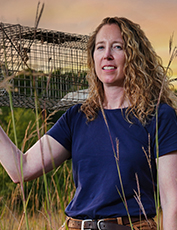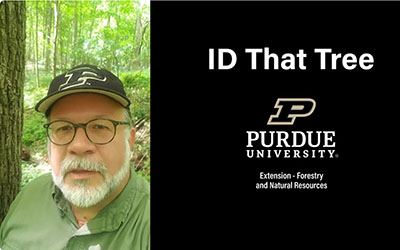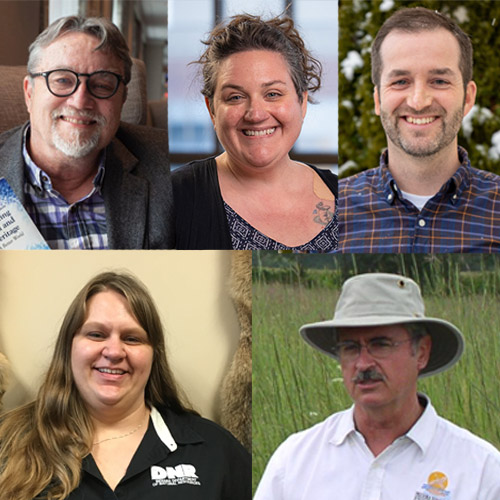Flaherty Honored; Hardiman, Liang Promoted
Dr. Elizabeth Flaherty was selected as Outstanding Club/Organization Advisor of the Year for the Purdue College of Agriculture, receiving the student-choice award as part of the College of Ag’s Spring Awards Banquet on April 27.
 Flaherty is the advisor for the Purdue student chapter of The Wildlife Society. She works with the chapter’s Quiz Bowl team, which won first place among all wildlife programs in the country at the TWS annual convention in 2019. Purdue’s Quiz Bowl team also posted podium finishes in 2018 (3rd), 2017 (2nd) and 2016 (3rd).
Flaherty is the advisor for the Purdue student chapter of The Wildlife Society. She works with the chapter’s Quiz Bowl team, which won first place among all wildlife programs in the country at the TWS annual convention in 2019. Purdue’s Quiz Bowl team also posted podium finishes in 2018 (3rd), 2017 (2nd) and 2016 (3rd).
She also leads the group through professional development opportunities; through an optimizing conference attendance course, which prepares students to attend the national TWS conference; and mentors students in the club as well as in her lab and classes.
“It is incredibly meaningful to know that the students appreciate the time and energy I devote to supporting our Wildlife Society students and other FNR undergraduates in their professional development,” Flaherty said.
Flaherty was previously honored with the TWS Student Chapter Advisor of the Year Award in 2020 and the organization’s Excellence in Wildlife Education Award in 2021. The Excellence in Wildlife Education Award celebrates sustained exemplary teaching and contribution to the improvement of wildlife education by individual faculty members.
Flaherty teaches three of the required courses in the wildlife major: Wildlife Habitat Management, Wildlife Investigational Techniques, and Forest Habitats and Communities. She also teaches the Optimizing Conference Attendance course, developed alongside FNR colleague Dr. Pat Zollner, as well as a graduate-level required Intro to Teaching Natural Resources course. Flaherty also has led study abroad courses in Cuba (2016) and Ecuador (2019).
Flaherty was honored for her teaching prowess with the 2020 Murphy Award and also was inducted as a Purdue Teaching Academy Fellow that year. Previously, she earned the Teaching Leadership Award from the Purdue University Teaching Academy and the Center for Instructional Excellence, received the College of Agriculture’s Kohls Undergraduate Teacher Award (Much to learn from annual Celebration of Teaching Excellence) and was an Honorable Mention selection for the college’s Unsung Diversity Hero Award. Flaherty was honored with FNR’s Outstanding Undergraduate Teaching Award in 2017 and 2018.
Promotions
FNR congratulates Drs. Brady Hardiman and Jingjing Liang for their promotions to associate professor with tenure on April 8.
 Hardiman, who has a joint appointment in environmental and ecological engineering, joined the faculty in FNR in January 2016 as an assistant professor. Hardiman received the Richard L. Kohls Outstanding Early Career Teaching Award in 2020.
Hardiman, who has a joint appointment in environmental and ecological engineering, joined the faculty in FNR in January 2016 as an assistant professor. Hardiman received the Richard L. Kohls Outstanding Early Career Teaching Award in 2020.
Hardiman earned his bachelor’s degree in biology from Ashland University in 2003. He completed his PhD in evolution, ecology and organismal biology at The Ohio State University in 2012, doing his dissertation on the Resilience of Forest Carbon Storage through Disturbance and Succession.
Before coming to Purdue, Hardiman was a postdoctoral associate in the Ecological Forecasting Laboratory and the Carbon Cycle Science and Urban Ecology Laboratory at Boston University, where he worked on forest community risk and resilience to climate change and the role of urban vegetation in regional carbon budgets.
The Hardiman lab is researching the mechanisms of long-term resilience of forest carbon storage, biogenic carbon emissions in the urban ecosystem and the effects of structural and biological diversity on forest productivity.
 Liang, an associate professor of quantitative forest ecology and co-founder of the Global Forest Biodiversity Initiative (GFBI) and the Forest Advanced Computing and Artificial Intelligence Lab (FACAI), came to Purdue in 2018 as an assistant professor.
Liang, an associate professor of quantitative forest ecology and co-founder of the Global Forest Biodiversity Initiative (GFBI) and the Forest Advanced Computing and Artificial Intelligence Lab (FACAI), came to Purdue in 2018 as an assistant professor.
Liang earned his bachelor's degree in ecology and environmental sciences from Peking University in 2001. He completed his PhD in forestry at the University of Wisconsin-Madison in 2005.
Before coming to Purdue, Liang was assistant professor of forest biometrics and management at the University of Alaska Fairbanks from 2007 to 2011. He was then an assistant and associate professor of forest ecology from 2011 to 2018.
Liang's research focuses on global biodiversity patterns and associated environmental and anthropogenic drivers, and he approaches this by utilizing machine learning and big data to help unravel the pressing issues facing the field today. In 2021, he received a grant funded by the Wold Resources Institute called "Mapping Planted Forests in China." He also led a collaborative project which estimated the total number of tree species on earth.






